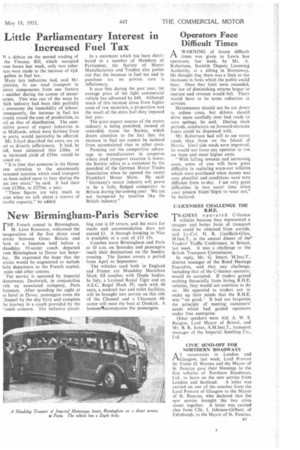Operators Face Difficult Times
Page 35

If you've noticed an error in this article please click here to report it so we can fix it.
A WARNING of future difficult
times was given to Lewis bus operators, last week, by Mr. A. Robertson, Scottish Deputy Licensing Authority, at a sitting in Stornoway. He thought that there was a limit to the increases in fares which the public could bear. Once that limit were exceeded, the law of diminishing returns began to operate and revenue would fail. There would have to be some reduction in services.
Maintenance should not be cut down to reduce costs, but drivers should drive more carefully over bad roads to save springs, he said. During slack periods, conductors on forward-entrance buses could be dispensed with.
Mr. Robertson had still to see worse roads than those on the Island of Harris. Until side roads were improved, he would not force any operator to run on them and incur higher costs.
"With falling revenue and increasing costs, some of you will have great difficulty in replacing worn-out vehicles which were purchased when money was very plentiful and conditions were very different from to-day. I see very great difficulties in two years' time when your Present birses'begin to 'wear out," he declared.
C-LICENSEES CHALLENGE THE R.H.E.
TR ADERS operat e'd C-licence
vehicles because they represented a cheaper and • better form of transport than could be obtained from outside, said Lt.-Col. H. R. Caulfield-Giles, M.Inst.T., at the annual dinner of the" Traders' Traffic Conference, in Bristol, last week. It was a challenge to the British Transport Commission.
In reply, Mr. G. Smart, M.Inst.T., district manager of the Road Haulage Executive, said that any challenge, including that of the C-licence operator, would be accepted. If traders gained nothing financially from hiring, R.H.E. vehicles, they would not continue to do so. He appealed to traders not to make up their minds that the R.H.E. was "no good.' It had not forgotten the principle of meeting customers' needs which had guided operators under free enterprise.
Other speakers were Aid, A. W. S. Burgess, Lord Mayor of Bristol, and Mr. B. R. Jones, A.M.Inst.T., transport manager of the Imperial Smelting Co., Ltd.
CIVIC SEND-OFF FOR NORTHERN ROADWAYS
AT ceremonies in London and Glasgow, last week, Lord Provost Sir Victor D. Warren and the Mayor of St. Pancras gave their blessings to the first vehicles of Northern Roadways, Ltd.. to leave on the new service from
London and Scotland. A letter was carried on one of the coaches from the Lord Provost of Glasgow to the Mayor of St. Pancras, who declared that the new service brought the two cities closer together. A letter was carried also from CM% 1. Johnson-Gilbert, of Edinburgh, to the Mayor of St. Pancras.




























































































